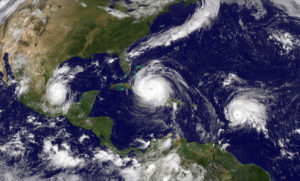
El Nino conditions are present in the northern hemisphere, the National Oceanic and Atmospheric Administration said in a report issued Monday, pointing to conditions that historically have meant a lower average number of storms during the hurricane season.
This does not, however, mean that the threat for a storm or hurricane impact is lower. As the adage goes, it only takes one storm coming ashore where you happen to live to ruin your whole year. At the VITEMA website, the agency offers tips on how to prepare for the hurricane season.
According to NOAA, there is an 80 percent chance of El Nino conditions continuing through the spring and a 60 percent likelihood of the condition lasting well into the summer. El Nino is part of a recurring climate pattern that occurs across a section of the Pacific off the South American Coast, according to NOAA. This can disrupt weather systems around the globe, particularly across the Atlantic. El Nino can create stronger-than-normal wind shear which hampers hurricane development in the Atlantic.
A majority of the forecast models are projecting above-average wind shear across the Caribbean as well as across the region from the Lesser Antilles to the coast of Africa. Increased wind shear tends to stall the development of weather systems.
The Colorado State University Tropical Weather Project is scheduled to release its annual prediction on the hurricane season next month. In a “very early” report issued Dec. 1, the day after the 2018 season ended, the Colorado team suggested the likelihood of an El Nino this year, which is typically associated with fewer Atlantic hurricanes.
“Most models predict that a weak to moderate El Niño will develop over the next few months,” CSU’s Phil Klotzbach and Michael Bell said in that long-range forecast. That is precisely what NOAA’s report says has taken place.
An average Atlantic hurricane season brings 12 named storms, six hurricanes and three major hurricanes.
The central and eastern Atlantic, from the Lesser Antilles to the coast of Africa, could end up being less active than it was during 2017 and 2018. While the wind shear factor may stall storm development, there are signals in the UKMET model (one of the weather models used by forecasters to predict hurricane activity) that suggests the southeastern Caribbean, the Windward Islands and Barbados could see a threat during August and September. Even more curious is that some of the analog data points to some sort of tropical threat across the Leeward Islands and the Virgin Islands.
2019 Cyclone Names
Names to be used for 2019 Atlantic Basin storms are Andrea, Barry, Chantal, Dorian, Erin, Fernand, Gabrielle, Humberto, Imelda, Jerry, Karen, Lorenzo, Melissa, Nestor, Olga, Pablo, Rebekah, Sebastien, Tanya, Van, Wendy.
Hurricane Prep Tour
National Hurricane Center Director Ken Graham and several federal hurricane specialists will visit with residents of vulnerable communities and discuss hurricane preparedness, resilience and how they can become “weather-ready.” Tours of the Air Force Reserve Command’s WC-130J “Hurricane Hunter” will offer an opportunity to learn how scientists collect hurricane information.
The tour will not visit the U.S. Virgin Islands, which are well-familiar with the Hurricane Hunters, since St. Croix is one of their bases during the storm season.
The tour will visit Veracruz, Mexico, Cozumel, Mexico, San Jose, Costa Rica, Aruba, Curacao and Aguadilla, Puerto Rico.





